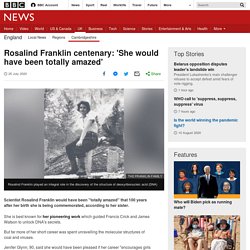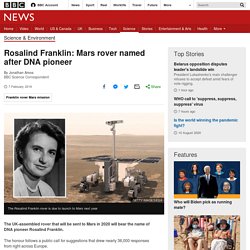

Rosalind Franklin: DNA's unsung hero - Cláudio L. Guerra. Rosalind Franklin centenary: 'She would have been totally amazed' Image copyright The Franklin family Scientist Rosalind Franklin would have been "totally amazed" that 100 years after her birth she is being commemorated, according to her sister.

She is best known for her pioneering work which guided Francis Crick and James Watson to unlock DNA's secrets. But far more of her short career was spent unravelling the molecular structures of coal and viruses. Jenifer Glynn, 90, said she would have been pleased if her career "encourages girls into science". Rosalind Franklin was one of five siblings who grew up in London.
She secured a place at the University of Cambridge to study chemistry in 1938, and charted her life there through weekly letters home. Mrs Glynn, who lives in Cambridge, said: "She always wanted the proof of things - while she was a good all-rounder at school, it was clear from the start she was going to be a scientist. "There was no feeling in the family or at the university that it was odd for a woman to study science.
" Image copyright SPL. Rosalind Franklin, pionnière de l'ADN. Le 18 octobre 1962, le prix Nobel de médecine est attribué à trois hommes, James Watson, Francis Crick et Maurice Wilkins, pour la découverte de la structure en double hélice de l’ADN.

Cette découverte, pourtant, on la doit avant tout à une pionnière de la biologie moléculaire : Rosalind Franklin. La biologiste a pâti de l'effet Matilda, ce phénomène qui désigne le fait que les recherches effectuées par des femmes sont souvent oubliées au profit de celles réalisées par des hommes. Pour concevoir cette théorie, Margaret Rossiter a approfondi celle de Robert King Merton. Dans les années 60, ce sociologue s’est intéressé à la façon dont certains grands personnages sont reconnus au détriment de leurs proches qui, souvent, ont participé aux travaux à l’origine de cette reconnaissance. Au début des années 80, l’historienne des sciences Margaret Rossiter reprend le concept et le pousse plus loin.
Sexism pushed Rosalind Franklin toward the scientific sidelines during her short life, but her work still shines on her 100th birthday. What do coal, viruses and DNA have in common?

The structures of each – the predominant power source of the early 20th century, one of the most remarkable forms of life on Earth and the master molecule of heredity – were all elucidated by one person. Her name was Rosalind Franklin, and the story of her triumph over sexism and rise to scientific greatness is made even more remarkable by the fact that she lived only 37 years. In Franklin’s day, sexism ran rampant in science. Her own father, judging science no career for a woman, actively discouraged her aspirations. Her doctoral supervisor at Cambridge, eventual Nobel Laureate Ronald G.W. Despite the attitudes of those around her, Franklin maintained her scientific acumen and thirst for knowledge, crucially contributing to one of the greatest discoveries of the 20th century. Becoming a chemist Franklin was born in London on July 25, 1920 to a prominent family. Franklin was an outstanding student. [Deep knowledge, daily. Rosalind Franklin: Mars rover named after DNA pioneer.
Image copyright Getty Images/ESA The UK-assembled rover that will be sent to Mars in 2020 will bear the name of DNA pioneer Rosalind Franklin.

The honour follows a public call for suggestions that drew nearly 36,000 responses from right across Europe. Astronaut Tim Peake unveiled the name at the Airbus factory in Stevenage where the robot is being put together. The six-wheeled vehicle will be equipped with instruments and a drill to search for evidence of past or present life on the Red Planet. Image copyright Max Alexander / AIRBUS Giving the rover a name associated with a molecule fundamental to biology seems therefore to be wholly appropriate. Rosalind Franklin played an integral role in the discovery of the structure of deoxyribonucleic acid. It was her X-ray images that allowed James Watson and Francis Crick to decipher its double-helix shape. Franklin's early death from ovarian cancer in 1958, aged just 37, meant she never received the recognition given to her male peers.